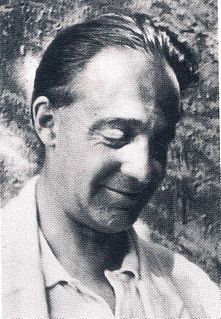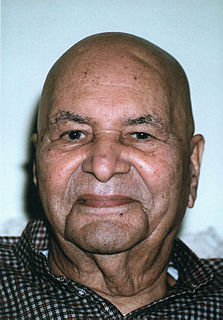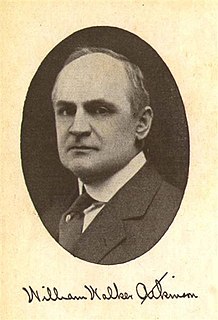A Quote by Arundhati Roy
As Estha stirred the thick jam he thought Two Thoughts and the Two Thoughts he thought were these: a) Anything can happen to anyone. and b) It is best to be prepared.
Related Quotes
If you realized how powerful your thoughts are, you would never think a defeatist or negative thought. Since we create through thought, we need to concentrate very strongly on positive thoughts. If you think you can't do something, you can't. But if you think you can, you may be surprised to discover that you can. It is important that our thoughts be constantly for the best that could happen in a situation - for the good things we would like to see happen.
My friend Heinrich Zimmer of years ago used to say, 'The best things can't be told,' because they transcend thought. 'The second best are misunderstood,' because those are the thoughts that are supposed to refer to that which can't be thought about, and one gets stuck in the thoughts. 'The third best are what we talk about.'
I am in awe of the perpetual tumult of the sea. I am moved by the still place on the horizon where the sky begins. I am stirred by the soaring and dipping fields that make the landscape into a rumpled green counterpane. I thought I would never have such powerful feelings again. I thought I would live through the rest of my life having experiences, and thoughts, but I never thought I would again feel deeply-- I was convinced that my wounds had healed and become thick scars, essentially numb.
History is one long chain of reflections. Hegel also indicated certain rules that apply for this chain of reflections. Anyone studying history in depth will observe that a thought is usually proposed on the basis of other, previously proposed thoughts. But as soon as one thought is proposed, it will be contradicted by another. A tension arises between these two opposite ways of thinking. But the tension is resolved by the proposal of a third thought which accommodates the best of both points of view. Hegel calls this a dialectic process
The one who follows the thought is also a thought! The one who follows the thought IS in thought. When you know that both are thoughts, you are home. You are not at home, you ARE home. Then allow thoughts to arise and allow them to be followed. You remain as That unmoved and unconcerned Being. This is the highest understanding.
We are sending out thoughts of greater or less intensity all the time, and we are reaping the results of such thoughts. Not only do our thought-waves influence ourselves and others, but they have a drawing power - they attract to us the thoughts of others, things, circumstances, people, 'luck', in accord with the character of the thought uppermost in our minds.
Anyway, now she thinks of Estha and Rahel as Them, because, separately, the two of them are no longer what They were or ever thought They would be. Ever. Their lives have a size and a shape now. Estha has his and Rahel hers. Edges, Borders, Boundaries, Brinks and Limits have appeared like a team of trolls on their separate horizons. Short creatures with long shadows, patrolling the Blurry End. Gentle half-moons have gathered under their eyes and they are as old as Ammu was when she died.





































